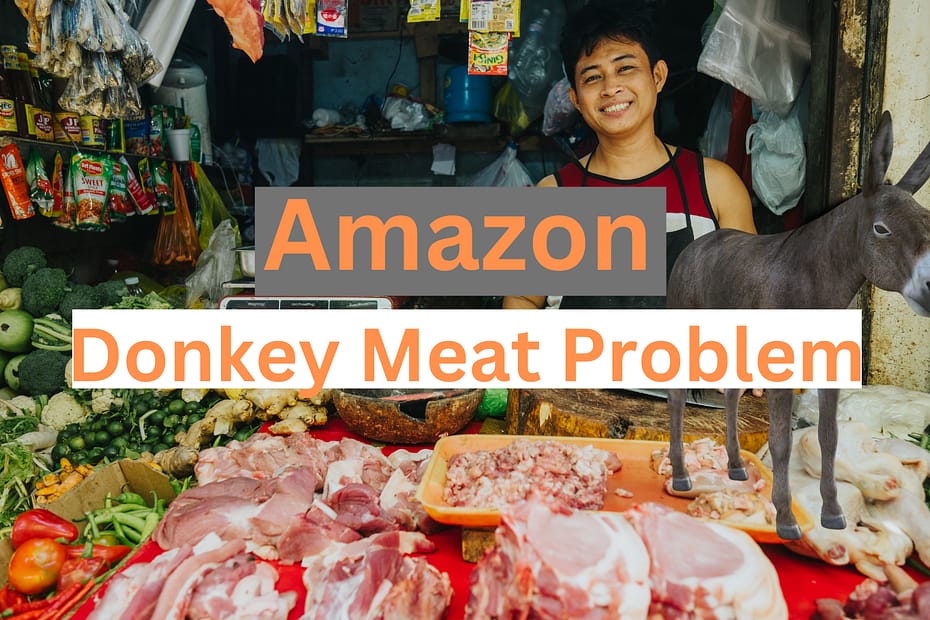Last Updated on: 29th March 2023, 10:11 pm
Amazon is one of the largest online retailers in the world, offering a wide range of products to customers around the globe.
However, recent controversy has erupted over Amazon’s sale of donkey meat, raising ethical and legal questions about the practice.
We will explore the controversy surrounding Amazon’s sale of donkey meat, its response to the issue, and the potential impact on its business.
The Controversy Surrounding Amazon’s Sale Of Donkey Meat
The controversy surrounding Amazon’s sale of donkey meat began when animal rights activists uncovered evidence that Amazon was selling the meat of donkeys, which are considered a protected species in many parts of the world.
The activists claimed that Amazon was violating animal welfare laws by selling the meat, and called on the company to stop the practice immediately.
The controversy has sparked a wider debate about the ethics of consuming donkey meat, with some arguing that it is a traditional food in certain cultures and should be allowed, while others argue that it is cruel and unethical to kill and eat donkeys.
Amazon’s Response To The Controversy
In response to the controversy, Amazon has issued a statement saying that it takes the issue of animal welfare very seriously and that it is working with suppliers to ensure that they comply with all relevant laws and regulations. The company has also stated that it will investigate any reports of animal abuse or mistreatment, and take appropriate action if necessary.
Despite these assurances, many animal rights activists and consumers remain skeptical of Amazon’s commitment to animal welfare and have called on the company to stop selling donkey meat altogether.
The Ethics Of Selling Donkey Meat
The ethics of selling donkey meat are complex and controversial. On the one hand, some argue that it is a traditional food in certain cultures and should be respected as such.
They argue that donkeys are no different from other animals that are commonly consumed, such as cows and pigs, and that it is hypocritical to single out donkeys for special treatment.
On the other hand, many people believe that donkeys are intelligent and sensitive animals that deserve to be treated with respect and dignity.
They argue that killing and eating donkeys is cruel and unethical and that it is wrong to exploit animals for human consumption.
The Legality Of Selling Donkey Meat
The legality of selling donkey meat varies from country to country. In some places, such as China and Mexico, it is legal to consume donkey meat and it is a common food item.
However, in other places, such as the United States and many European countries, it is illegal to sell or consume donkey meat.
Amazon operates in many different countries, and it is unclear whether the company’s sale of donkey meat violates any laws or regulations in those countries.
The Impact On Amazon’s Reputation & Customer Trust
The controversy surrounding Amazon’s sale of donkey meat has raised concerns about the company’s reputation and customer trust.
Many consumers are disgusted by the idea of eating donkey meat and may be hesitant to do business with Amazon if they believe the company is engaging in unethical practices.
The controversy has sparked a wider debate about Amazon’s commitment to social responsibility and sustainability.
Some critics argue that Amazon’s focus on profits at all costs has led to a disregard for ethical and environmental concerns and that the company must do more to address these issues if it wants to maintain its position as a leading online retailer.
Amazon’s Response and Measures
Upon the release of the news about the donkey meat problem, Amazon quickly responded to the allegations.
The company released a statement clarifying that they had strict policies and procedures in place to ensure that their sellers comply with their product quality standards.
They also stated that they had taken down the offending listings and would be conducting an investigation to determine the source of the problem.
Amazon also stated that they would be implementing measures to prevent this type of incident from happening again. These measures include:
- Increasing their efforts to monitor and remove listings that violate their policies
- Strengthening their verification processes for new and existing sellers
- Implementing new systems to detect and prevent the sale of prohibited items, including animal products
The Donkey Meat Industry in China
The discovery of donkey meat being sold on Amazon highlights a larger issue in China’s donkey meat industry. The demand for donkey meat in China has skyrocketed in recent years, leading to concerns about animal welfare and sustainability.
China is the largest consumer of donkey meat in the world, with an estimated consumption of 4 million donkeys per year.
The country’s donkey population has been declining rapidly, leading to an increase in the price of donkey meat. This has led to a rise in the number of donkeys being stolen and illegally slaughtered.
The donkey meat industry in China has been under scrutiny for several years due to concerns about animal welfare and food safety. In 2017, China implemented regulations requiring all donkey slaughterhouses to have video surveillance to ensure that animals were being treated humanely.
Many slaughterhouses have not complied with these regulations, leading to continued concerns about animal welfare and illegal practices.
The Implications for Animal Welfare
The discovery of donkey meat being sold on Amazon also raises concerns about the welfare of animals used for meat production. Donkeys are intelligent and social animals that require proper care and treatment.
The illegal and unregulated slaughter of donkeys for their meat often involves inhumane practices that cause immense suffering.
There are also potential health risks associated with consuming illegal and unregulated meat products. These products may be contaminated with harmful substances, such as antibiotics or other drugs, which can pose a risk to human health.
The sale of illegal and unregulated meat products on Amazon also has broader implications for animal welfare and food safety around the world.
It highlights the need for greater regulation and monitoring of the global meat industry to ensure that animals are treated humanely and that the meat produced is safe for human consumption.
What Consumers Can Do
As consumers, we have a responsibility to be informed about the products we purchase and to support companies that prioritize ethical and sustainable practices.
When shopping online, it is important to read product descriptions and reviews carefully and to do research on the companies and sellers before making a purchase.
Consumers can also support organizations that advocate for animal welfare and sustainable meat production.
By supporting these organizations, we can help to create a more ethical and sustainable meat industry and reduce the demand for illegal and unregulated meat products.
Conclusion
The discovery of donkey meat being sold on Amazon highlights the need for greater regulation and monitoring of the global meat industry. It also underscores the importance of consumer awareness and responsibility in supporting ethical and sustainable practices.
By taking steps to support sustainable and ethical meat production, we can help to create a more just and humane world for animals and humans alike.



